|
|
|
Sort Order |
|
|
|
Items / Page
|
|
|
|
|
|
|
| Srl | Item |
| 1 |
ID:
160411
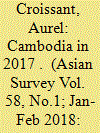

|
|
|
|
|
| Summary/Abstract |
After local elections in 2017, the Cambodian People’s Party intensified its attacks on free media, NGOs, and the Cambodian National Rescue Party. Meanwhile, stronger links to China and waning Western leverage are enabling Prime Minister Hun Sen to transform the post-1993 multiparty system into a patrimonial dictatorship. Cambodia enjoyed strong economic growth but saw little improvement in its weak institutional framework, in social justice, or in economic competitiveness.
|
|
|
|
|
|
|
|
|
|
|
|
|
|
|
|
| 2 |
ID:
173782


|
|
|
|
|
| Summary/Abstract |
The 2014 Sunflower Movement led to rising political participation among young Taiwanese. Hence, opposition parties and civic groups created programs to support young candidates running in the village chief elections. Compared with the 2010 election, however, fewer young challengers ran in 2014, and they received fewer votes and won fewer seats. Propensity score matching shows that the presence of young candidates on ballots did not increase turnout. However, young candidates affected the election indirectly: young, new candidates attracted more votes from incumbents than from challengers and therefore decreased the incumbent re-election rate.
|
|
|
|
|
|
|
|
|
|
|
|
|
|
|
|
| 3 |
ID:
117076
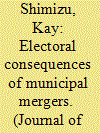

|
|
|
|
|
| Publication |
2012.
|
| Summary/Abstract |
The dominance of Japan's Liberal Democratic Party (LDP) was long buttressed by the existence of a strong political support base in the rural areas led by local politicians who worked on behalf of national LDP politicians seeking reelection. In recent years, municipal mergers have drastically weakened the LDP's support base by reducing the number of local politicians and redrawing electoral district boundaries. Surprisingly, the main opposition party, the Democratic Party of Japan (DPJ), could not take full advantage of these new institutional arrangements. Instead, local politicians have become more independent of both major parties. As a result, at a time of increasing numbers of floating voters, neither of Japan's two major parties has a reliable local base across the country. To succeed, both parties must pay attention to the changing needs of the increasingly independent-and very often still rural-localities.
|
|
|
|
|
|
|
|
|
|
|
|
|
|
|
|
| 4 |
ID:
168836


|
|
|
|
|
| Summary/Abstract |
This article assesses the effects of candidate gender, incumbency, and local ethnic composition on the electoral performance of ethnic party candidates in mayoral elections in Romania and Slovakia. The results of my statistical analysis indicate that candidate gender has a minimal effect on electoral performance, whereas incumbency and local ethnic composition have a large and statistically significant effect. My findings also suggest that more experienced incumbents do not outperform less experienced incumbents, male and female incumbents enjoy a similar incumbency advantage, and ethnic party incumbents are able to attract voters from outside their target ethnic constituency.
|
|
|
|
|
|
|
|
|
|
|
|
|
|
|
|
| 5 |
ID:
180697
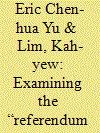

|
|
|
|
|
| Summary/Abstract |
This paper analyzes the extent to which the performances of local and national governments can shape local election outcomes. Specifically, we use various waves of survey data from Taiwan’s Elections and Democratization Studies (TEDS) to explore whether a person’s assessments of local and central government performances affect his/her vote for the incumbent party candidate. Our empirical findings partially verify the so-called “referendum theory” and can be summarized as follows: First, voters who hold a positive assessment of the performance of local government are more likely to vote for an incumbent who seeks reelection, but this is not necessarily the case for an incumbent party candidate in an open-seat contest. Second, Taiwan’s local elections cannot be regarded as referenda on the central government because the central government approval rating does not consistently affect vote choices across different types/levels of local elections.
|
|
|
|
|
|
|
|
|
|
|
|
|
|
|
|
| 6 |
|
| 7 |
ID:
153785


|
|
|
|
|
| Summary/Abstract |
Individual-level studies of electoral turnout and vote choice have focused largely on personal attributes as explanatory variables. We argue that scholars should also consider the social network in which individuals are embedded, which may influence voting through variation in individuals’ social proximity to elites. Our analysis rests on newly discovered historical records revealing the individual votes of all electors in the 1859 statewide elections in Alexandria, Virginia and the 1874 municipal elections in Newport, Kentucky, paired with archival work identifying the social relations of the cities’ populations. We also replicate our core findings using survey data from a modern municipal election. We show that individuals more socially proximate to elites turn out at a higher rate and individuals more socially proximate to a given political party’s elites vote disproportionately for that party. These results suggest an overlooked social component of voting and provide a rare nineteenth-century test of modern voting theories.
|
|
|
|
|
|
|
|
|
|
|
|
|
|
|
|
| 8 |
ID:
077756


|
|
|
|
|
| Publication |
2007.
|
| Summary/Abstract |
The 1979 UN Convention on the Elimination of all Forms of Discrimination against Women highlights the importance of equal participation of women in public life. Since the early 1960s, women in Japan have voted in elections at significantly higher rates than men. However, Japanese women's equal participation in policy formulation and decision making lags far behind major democracies. Gender equality is stated under the Japanese Constitution, but social practices are far from equal. There are no legal constraints on Japanese women's right to candidacy for public office, but they are far underrepresented in local and national elected assemblies. In 1999 an important landmark in the substantial progress towards gender equality took place when the Japanese government, for the first time, legally denounced the stereotyped division of roles on the basis of gender and described men and women as equal partners. An unprecedented amount of legislation, together with policy changes and organizational reform at the national level were introduced from this state-led initiation. In the same year, women's grassroots groups were rapidly moving beyond the reach of policy, organizational, and legal changes; they successfully conducted a major nationwide campaign for 'More Women to Assemblies¡' and increased the number of elected women representatives at the local level at an unprecedented rate. The purpose of this article is to assess the potential of increased women's political voices in Japan, which can be seen as an alternative way of solving the problems of political disengagement in the male-dominated representative democracy. To this end, the article examines the course of watershed events in 1999 towards a gender-equal society in Japan, with special emphasis on the importance of grassroots missions in eliminating barriers to Japanese women's political participation
|
|
|
|
|
|
|
|
|
|
|
|
|
|
|
|
| 9 |
ID:
144677


|
|
|
|
|
| Summary/Abstract |
Israeli national parties show a high variance in their tendency to compete in local elections for local authorities’ mayoral position and council seats. Indeed national parties can use local electoral competition to garner support for national elections. However, national parties might be also exposed to local losses and commitments which will hurt their performance in national elections. The results of Israeli ballot-box data from the 2006 national and the 2008 local elections show that Israeli national parties’ decision whether to compete in local elections is affected by the local support patterns in national elections, parties’ valence and the locality’s peripherality.
|
|
|
|
|
|
|
|
|
|
|
|
|
|
|
|
| 10 |
ID:
126965


|
|
|
|
|
| Publication |
2013.
|
| Summary/Abstract |
Against all odds, South Korea's 2010 local elections were a landslide victory for the coalition of the opposition political parties. This article aims to provide an insight on the dynamic nature of Korean elections and politics by using a public opinion survey in Seoul's mayoral election as a case study. This article finds that the "north wind" triggered by the sinking of the South Korean battleship Cheonan helped the ruling party candidate, but not as much as the ruling party had hoped. Furthermore, a high turnout of the younger voters helped the opposition party candidate by showing a clear generation gap in terms of the important issues, ideology, and party orientation.
|
|
|
|
|
|
|
|
|
|
|
|
|
|
|
|
| 11 |
ID:
187161


|
|
|
|
|
| Summary/Abstract |
This paper discusses the political legacies of transmigration in local elections in Indonesia. Lampung province has an unusual ethnic make-up because in the past 100 years both the Dutch colonial administration and Indonesian Government have been implementing a transmigration programme. Transmigration has therefore changed the demographic pattern of Lampung. Since 2005, the mode of local election has been changed from indirect to direct. As a consequence of this, there is a revival of ethnic identity politics in local elections. In this paper, we focus on a transmigration affected area where the descendants of Javanese transmigrants are numerically dominant and correspondingly powerful in local politics. This research leads us to argue that ethnicity has become an important factor in local elections and that in transmigration affected areas it has led to the political domination of Javanese transmigrant descendants in local politics. We further to show how, in response to this, native Lampungese elites have adopted a number of strategies to help them retain a role in local politics. Our argument runs contrary to that of some scholars who have claimed that ethnicity is playing a diminishing role in Indonesian local elections.
|
|
|
|
|
|
|
|
|
|
|
|
|
|
|
|
| 12 |
ID:
145754
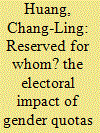

|
|
|
|
|
| Summary/Abstract |
Since the 1990s, gender quotas in elections have become a global phenomenon.
One of the issues raised about gender quotas concerns the qualifications of quota women. A previous study that looked at France’s parity law showed quota women are as competent as or even more competent than non-quota women or non-quota men. The French experience, under the proportional representation system, only allows for a comparison of average qualifications between quota women and their non-quota counterparts.
|
|
|
|
|
|
|
|
|
|
|
|
|
|
|
|
| 13 |
ID:
095672


|
|
|
|
|
| Publication |
2010.
|
| Summary/Abstract |
Under special circumstances created by a government decision to partly merge and upgrade six counties and county-level cities to special municipality status, local elections took place on December 5, 2009 in areas covering less than half of Taiwan's population. The results are generally seen as an important, though small, victory for the opposition Democratic Progressive Party (DPP). The ruling Kuomintang (KMT) (Guomindang), however, has remained in a stable position, while the DPP still has a long way to go towards a comeback.
|
|
|
|
|
|
|
|
|
|
|
|
|
|
|
|
| 14 |
ID:
102076


|
|
|
| 15 |
ID:
137909


|
|
|
|
|
| Summary/Abstract |
Taiwan in 2014 was eventful. In the Sunflower Student Movement early in the year, students occupied Parliament for 23 days. In local elections in November, the ruling Kuomintang was dealt a crushing blow by the electorate. President Ma will face more difficulties in the remaining years of his term in office.
|
|
|
|
|
|
|
|
|
|
|
|
|
|
|
|
| 16 |
ID:
164949
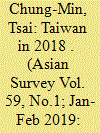

|
|
|
|
|
| Summary/Abstract |
President Tsai Ing-wen and the ruling Democratic Progressive Party suffered a crushing defeat in local elections in late November. While economic growth remains robust, with GDP per capita rising, the challenge for Tsai is to adjust policy lines and earn support for the coming presidential election.
|
|
|
|
|
|
|
|
|
|
|
|
|
|
|
|
| 17 |
ID:
090272


|
|
|
|
|
| Publication |
2009.
|
| Summary/Abstract |
In December 1977 an independent candidate named Mehdi Zana was elected mayor of Diyarbak?r, one of the biggest cities in Turkey's southeastern region. His election was a striking event, upsetting the troika of class, party, and state that had maintained a tight hold over the local political apparatus in Diyarbak?r since the 1940s. Unlike most prior mayors of Diyarbak?r, Zana did not come from a prominent family of local notables but was a working-class tailor with a middle-school education. He was one of only two independent candidates who won electoral contests in Turkey's sixty-seven big-city races; his election therefore flew in the face of a national trend that favored candidates from the country's two main political parties. Zana was well known for his left-wing, Kurdist politics, and at the time of his election he already had spent several years in jail for his activism. In a system that suppressed collective expressions of Kurdish identity, he was thus a clear ideological interloper.
|
|
|
|
|
|
|
|
|
|
|
|
|
|
|
|
| 18 |
ID:
169039


|
|
|
|
|
| Summary/Abstract |
The gender gap in national and local politics is an important problem in numerous countries. Two explanations for the deficit experienced by female politicians relate to demand for women’s representation by political parties and by voters. We argue that the gender gap stems from party-based limitations in local politics. Women do not compete in local politics because relevant parties do not nominate them. We present original data on mayoral candidates who ran in the 2009 and 2014 Turkish local elections. Our findings show that women are less likely to be nominated for office and reasons for this gap originate from party choices rather than lack of electoral support for women.
|
|
|
|
|
|
|
|
|
|
|
|
|
|
|
|
|
|
|
|
|